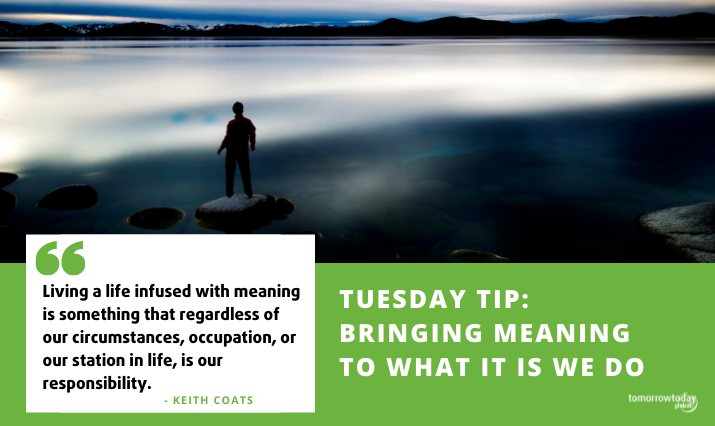This Tuesday Tip may or may not ‘solve a problem’. It also might appear to be a bit of a ‘ramble’…so bear with me. It won’t take much of your time but might prove to be very significant. That would be my hope at least.
Background:
Many years ago (I don’t recall where) I read that meaning is never something we extract from our work but rather something we bring to our work.
That stuck with me.
For some their jobs are infused with obvious meaning but, for many of us, that ‘obvious meaning’ might be somewhat obscured or seem less important when stacked against those who get to perform life-saving surgery or whose contribution alleviates suffering and destruction.
What this means is that regardless of what it is we do, we…both you and I, own the responsibility for finding a sense of meaning and purpose in our work. It points to an internal locus of control for meaning rather than something that is external and therefore beyond our control.
Hold this thought.
Let’s fast forward to today where I am reading a wonderful life-giving book by palliative carer Bronnie Ware titled, The Top Five Regrets of the Dying.
In it she shares the story of Pearl, one of her terminally ill patients. Pearl had come to accept that her time had come. Some thirty years prior to this Pearl had buried her husband who had died in a work accident and then, within a year, their only child Tonia, who had died of leukaemia at the tender age of only eight years old. It had been a very difficult and dark time in Pearl’s life and yet it was from these ashes that Pearl had discovered the perspective that allowed her to face her final days in a cheerful and meaningful manner.
Pearl shared with Bonnie that from the darkness she had learnt that ‘no-one owes us anything; we only owe it to ourselves to get off our backsides, count our blessings and face our challenges’. She shared how she believed that Tonia had, ‘come into my life to teach me unconditional love’. She went on to share that, ‘finding true purpose in our work (and lives) was just a matter of perspective’. Pearl had accepted the responsibility for finding that perspective and then living by it.
So, the point is that we bring meaning to what it is we do; living a life infused with meaning is something that regardless of our circumstances, occupation, or our station in life, is our responsibility. In short, we accept agency for our own happiness and sense of fulfilment.
So, my challenge for you (and me):
It is said that the ‘mind works best in the presence of a question’ so here then are some questions, respectfully offered, for your consideration and exploration:
- How might you ensure that whatever it is you do (by way of work) has purpose and meaning here and now?
- Who or what might be preventing you from accepting the responsibility for finding purpose and meaning in whatever it is you do?
- If finding this imbedded meaning and purpose seems elusive, how might a change in perspective help?
- What would it take to achieve such a ‘change in perspective’?
In closing: (my final rambling…)
There are potentially many unspoken roadblocks standing in the path of us taking responsibility for finding meaning. Maybe you feel that your children should phone you more than they do; perhaps you simmer internally that your contribution is not appreciated or recognised; perhaps you feel that you’re taken for granted; perhaps the ‘if only’ constantly mutes and drowns out any sense of appreciation of the ‘here and now’.
I would think that given the complexity and fabric of our lives, the examples and list is perhaps endless. These might be but just some of the more obvious ones we (all) struggle with from time to time. Over time they stack up allowing us to point to others and circumstances ‘out there’ rather than taking responsibility within ourselves for locating ‘meaning’. A lifetime of doing this will lead to living with regrets that are entirely avoidable.
Pearl had found her truth. She had learnt how to accept responsibility for finding her sense of meaning in whatever work she did, in whatever life had placed in her path. She had refused to ‘play the victim’ and had come to realise that ‘only youowe yourself’ and because of that, her final days were a joy and gift to all those around her.
It is a profoundly simple yet challengingly difficult truth by which to live.
I for one would like to live by that truth…and just maybe, like Pearl, will be able to face my own inevitable end knowing that my life was infused with meaning.
Now that is something worth living for!
About the author of today’s Tuesday Tip – Keith Coats
The world needs a new leadership response to a global context of change, complexity and uncertainty. Leadership Thinker (and author of today’s Tuesday Tip), Keith Coats is passionate about helping audiences around the world to understand what this response looks like and to equip leaders with the tools needed to respond to this changing context.



Trackbacks/Pingbacks